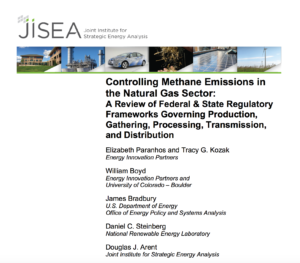T his study focuses on onshore natural gas operations and examines the extent to which oil and gas firms have embraced certain organizational characteristics that lead to ‘high reliability’—understood here as strong safety and reliability records over extended periods of operation. The key questions that motivated this study include whether onshore oil and gas firms engaged in exploration and production and midstream (i.e., natural gas transmission and storage) are implementing practices characteristic of high reliability organizations and the extent to which any such practices are being driven by industry innovations and standards and/or regulatory requirements.
Highly Reliable Organizations in the Onshore Natural Gas Sector: An Assessment of Current Practices, Regulatory Frameworks, and Select Case Studies
By Brad Axelrad|
2017-09-05T03:37:07-06:00
September 5th, 2017|Clean Energy, Policy, Regulations, Solar|Comments Off on Highly Reliable Organizations in the Onshore Natural Gas Sector: An Assessment of Current Practices, Regulatory Frameworks, and Select Case Studies
Related Posts
-
Controlling Methane Emissions in the Natural Gas Sector: A Review of Federal & State Regulatory Frameworks Governing Production, Gathering, Processing, Transmission, and Distribution
February 15th, 2017 | Comments Off on Controlling Methane Emissions in the Natural Gas Sector: A Review of Federal & State Regulatory Frameworks Governing Production, Gathering, Processing, Transmission, and Distribution -
Joint Institute for Strategic Energy Analysis, The Regulatory Framework Governing Unconventional Natural Gas Development, Natural Gas and the Transformation of the U.S. Energy Sector: Electricity.
February 1st, 2017 | Comments Off on Joint Institute for Strategic Energy Analysis, The Regulatory Framework Governing Unconventional Natural Gas Development, Natural Gas and the Transformation of the U.S. Energy Sector: Electricity.







